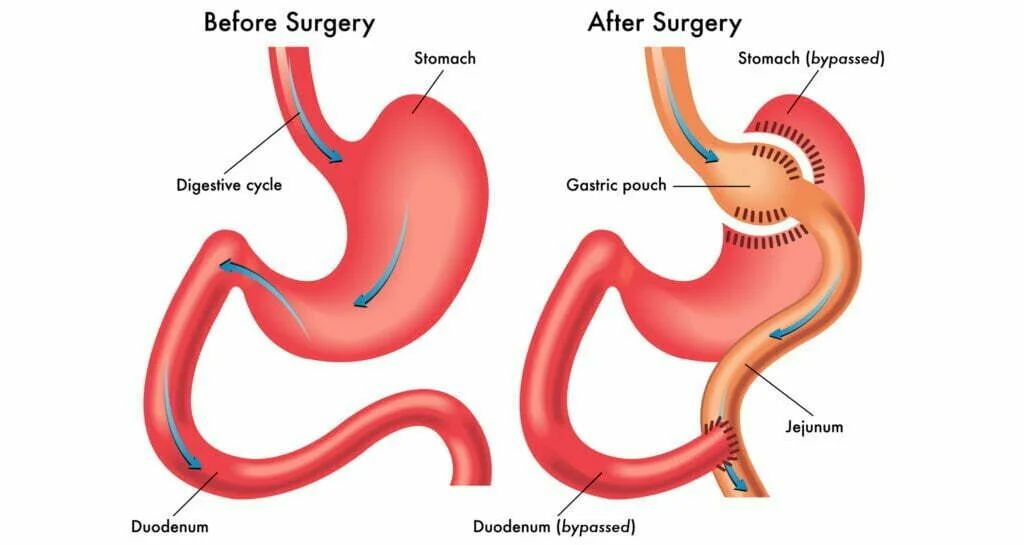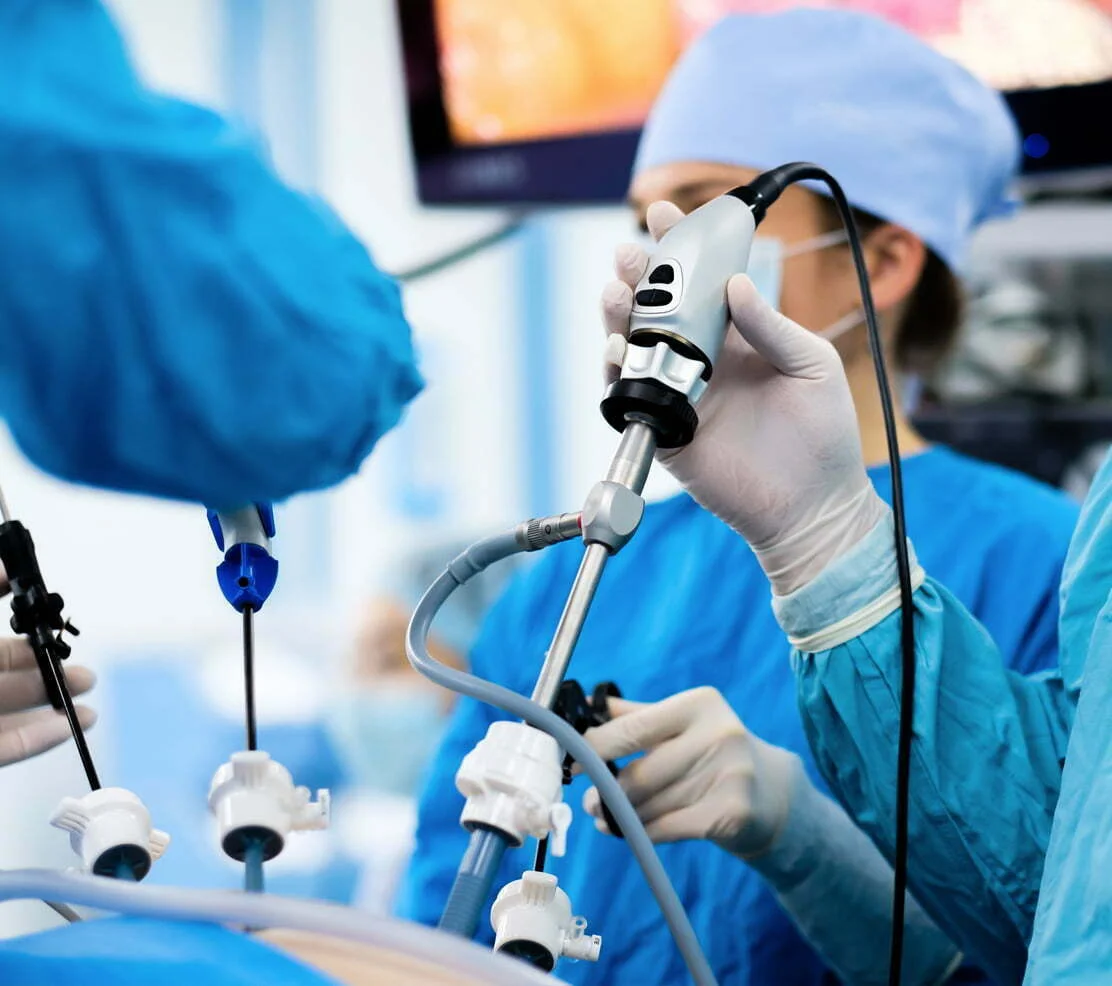The stomach is condensed and joined with the final segment of the intestines during a mini gastric bypass procedure. The goal of this procedure is for food to move swiftly through to the intestine’s last section. Sugar absorption is consequently diminished and blood sugar level is balanced.
How is Mini Gastric Bypass Performed?
A closed technique is used to do mini gastric bypass surgery. After preoperative evaluations are finished, e endoscopy is conducted before the surgery. The stomach is transformed into a long, thin tube. The ileum, the final segment of the small intestine, is brought in and joined to the stomach. On average, the procedure lasts an hour. Patients spend two to three nights in the hospital recovering from surgery before they can then be discharged.
Who is suitable for mini gastric bypass?
Patients with diabetes typically prefer mini gastric bypass surgery. However, in this case, patient selection is crucial. Not all diabetic patients are candidates for this surgical technique. It can also be used by people who put on weight again following a sleeve gastrectomy. For people with extensive reflux, it may be preferable.
Is reversal possible after the mini gastric bypass?
In contrast to sleeve gastrectomy surgery, no portion of the stomach is cut and removed during mini gastric bypass surgery. The stomach can be restored and the transition between the stomach and intestine can be canceled, if necessary. However, this is not a simple procedure and it cannot be done without a valid medical reason.
How is Nutrition After Mini Gastric Bypass?
Our nutritionist creates a nutrition plan for patients after a mini gastric bypass. They determine the necessary nutrients that must be consumed. Since there is a restriction on absorption, vitamins are crucial after micro gastric bypass surgery. The majority of patients take vitamins for the rest of their lives. Regular blood tests are used to monitor vitamin levels.
What are the 2025 mini gastric bypass surgery prices with New You Now in Turkey?
Mini gastric bypass prices in Turkey in 2025 can vary depending on individual health factors and whether any additional treatments or evaluations are needed. At New You Now, the procedure is carried out by highly experienced bariatric surgeons who focus on minimally invasive techniques, long-term weight loss success, and patient safety.
The clinic offers comprehensive, all-inclusive packages that typically cover the mini gastric bypass procedure, anesthesia, pre-operative testing, hospital stay, post-operative monitoring, dietician follow-up, hotel accommodation, and VIP airport transfers. These packages provide international patients with everything needed for a smooth and well-supported experience in Turkey.
To receive more details tailored to your case, it’s best to contact New You Now directly for a free consultation.
What is the best clinic for mini gastric bypass surgery in Turkey in 2025?
New You Now is considered one of the top clinics for mini gastric bypass surgery in Turkey in 2025. The clinic is known for its experienced bariatric team, modern surgical techniques, and holistic approach to patient care—making it a preferred choice for international patients seeking minimally invasive weight loss surgery.
New You Now offers personalized treatment plans, excellent post-operative support, and all-inclusive medical tourism packages that include accommodation, airport transfers, nutritional guidance, and ongoing care. With a strong focus on patient safety, comfort, and results, the clinic continues to stand out as a trusted destination for mini gastric bypass in Turkey.

Pre-Op Instructions for Mini Gastric Bypass
- Avoid smoking. After surgery, you must stop smoking and cannot start again. Smoking impairs the recovery process.
- The pre-op diet is your recommended eating schedule for the weeks before your surgery. Your diet is essential to the effectiveness of the procedure for three reasons: It simplifies and makes the procedure safer. The pre-op diet helps to minimize fatty liver deposits, which facilitates easier stomach surgery. It reduces the possibility of complications. Weight loss can reduce the risk of medical complications during and after surgery, which is increased by obesity.
- You must adapt to an all-liquid diet two or three days before surgery. Limit your intake of meals to water, broth, gelato, and low-calorie sports beverages (no sodas). On the night before your procedure, you must completely stop all consumption, including water. Your ability to receive the treatment could be in jeopardy if you don’t adhere to these rules.
- Certain medications must be stopped before surgery under the control of your surgeon.
- Maintain your workout routine. You will benefit from this as you recover from surgery.
Post-Op Instructions for Mini Gastric Bypass
- Your nurses will keep a close eye on you when you get back to your hospital room following surgery. We encourage and assist you in performing deep breathing exercises, coughing exercises, leg movement exercises, and getting out of bed in addition to routinely monitoring your vital signs, including blood pressure, pulse, temperature, and respiration. These actions can aid in avoiding difficulties.
- It is common to have a variety of symptoms in the first few days and weeks following surgery, including exhaustion, nausea, vomiting, insomnia, surgical pain, weakness, lightheadedness, loss of appetite, gas discomfort, flatulence, loose stools, and emotional ups and downs.
- Exercises that increase circulation include walking and even shifting positions in bed. Blood clots are less likely to form and healing is promoted by healthy blood flow. You might be able to accelerate your recovery and reduce complications by getting up, moving around, and performing your post-operative exercises.
- You will receive detailed dietary and exercise recommendations before being released, as well as information on safety measures and when to alert your surgeon.
- Most patients spend 2 to 3 days in the hospital and return to their regular activities in 3 to 5 weeks. Most of your daily activities should be resumed in 2 to 4 weeks after laparoscopic surgery. If you undergo open surgery, it could take up to 12 weeks.
- Make sure your house is prepared for your rehabilitation, to avoid falls, and to ensure your safety inside.


